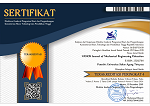CHARACTERISTICS OF EFFECTIVE VOCATIONAL EDUCATION IN THE INDUSTRIAL REVOLUTION 4.0.
Abstract
Effective vocational education is a dream for students, especially the community and parties involved in vocational education. Vocational schools are required to graduate their students according to what is needed by the industry in the field. Vocational education is expected to collaborate with industry to jointly develop or develop curriculum so that there is no deviation between the SMK and the industry. The purpose of this study is to find effective and efficient vocational education indicators. The research method used is a qualitative research with a descriptive approach. The results of the study found in the characteristics of effective SMKs that are the basis for developing school performance indicators can be grouped into six aspects, namely: (1) Program for improving vocational student achievement; (2) Practice learning both theory and practice; (3) School leadership; (4) Staff development and development; (5) Environmental conditions and academic climate in SMK; and (6) The participation of parents in the administration of education. SMK Negeri 2 Kotif Palopo is one of the vocational schools in the field of technology that is professional in graduating students. In this case, the graduates of SMK Negeri 2 Kotif Palopo have been scattered everywhere, especially in local industries and large industries in Indonesia, especially in Makassar City and North Sulawesi.
Keywords
Full Text:
PDFReferences
Bartel, C. R. (1976). Instructional analysis and materials development. USA: American Technical Society.
Brophy, J. (1986). Classroom management techniques. Education and urban society, February 1986, 182-195.
Brown, R. (2004). School culture and organization: Lesson from research and experience. A background paper for the Denver commission on secondary school reform. New York: Teachers College Press.
Clarke, L & Winch. C. (2007). Vocational Education: Internasional Approaches, Developments, and Systems. New York: Routledge.
Davis, G. A & Thomas, M. A. (1989). Effective school and effective teacher. Boston: Allyn and Bacon.
Denzin, N. K & Lincoln, Y. S. (Ed). (2009). Handbook of qualitative research. California: Sage Publications, Inc.
Evans, R. N. & Edwin, L. H. (1978). Foundatiins of vocational education. (2nd ed). Columbus, OH: Charles E. Merrill Publishing Company.
Haigh, N & Katterns, B. (1984). Teacher effectiveness: problems of goal for teacher education. Journal of teacher education, XXXV (5), 23-27.
Herminanto, S. (2005). Pengembangan kultur sekolah. Program Pascasarjana Universitas Negeri Yogyakarta.
Irwanto. (2011). Studi komparasi sekolah menengah kejuruan yang efektif di daerah Istimewa Yogyakarta. Disertasi Doktor. Tidak diterbitkan. Universitas Negeri Yogyakarta.
Koesoema, A. D. (2009). Pendidikan karakter di zaman keblinger. Jakarta: PT Gramedia Widiasarana Indonesia.
Miles, M. B & Huberman, A. M. (1994). Qualitative data analysis: An expanded sourcebook. London: Sange Publication.
Muchlas Samani. (1992). Keefektifan program pendidikan STM: studi penelitian pelacakan terhadap lulusan STM rumpun mesin tenaga dan teknologi pengerjaan logam di Kotamadya Surabaya tahun 1986 dan 1987. Disertasi Doktor. IKIP. Jakarta.
Slamet, P. H. (2005). MBS, life skills, KBK, CTL, dan saling keterkaitannya. Handout kapita selekta desentralisasi pendidikan di Indonesia. Jakarta: Departemen pendidikan nasional.
--------.(2008). Sekolah sebagai sistem. Handout I desentralisasi pendidikan di Indonesia. Jakarta: Depdiknas.
Squires, D. A., Huitt, W. G., & Segars, J. K. (1983-84). Effective schools and classrooms: A research-based perspective. Alexandria Virginia, Association for supervision and curriculum development, 225th North Washington Street.
Suharsimi, A. (1993). Studi pengembangan sekolah efektif pada jenjang SLTP di D. I. Yogyakarta. Laporan penelitian tidak dipublikasikan. Cadedcom International Corp, Canada dan Tridarma FIFITA, Indonesia.
Sukamto. (1999). Perencanaan dan pengembangan kurikulum pendidikan teknologi dan kejuruan. Jakarta: departemen pendidikan dan kebudayaan.
Tilaar, H. A. R. (1991). Sistem pendidikan nasional yang kondusif bagi pembangunan masyarakat industri modern berdasaarkan Pancasila, Makalah disajikan pada Kongres Ilmu Pengetahuan Nasional V, Jakarta 3 - 7 September 1991. Jakarta.
Usman, M. U. (2008). Menjadi guru profesional. Bandung: PT Remaja Rosdakarya.
Wenrich, C. R & Wenrich, W. J. (1974). Leadership in Administration of Vocational and Technical Education. Ohiu: Charles. E. Merril Publishingco.
Yin, R. K. (1984). Case study research design and methods. Beverly Hills Sage Publication.
DOI: http://dx.doi.org/10.30870/vanos.v4i1.6107
Refbacks
- There are currently no refbacks.

This work is licensed under a Creative Commons Attribution 4.0 International License.


.png)
.png)
